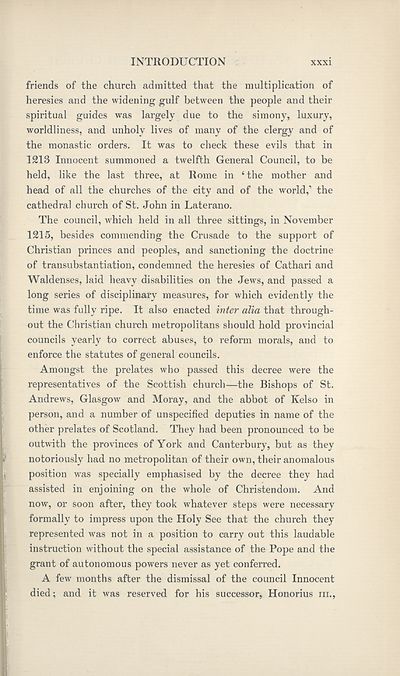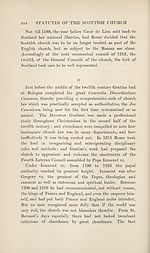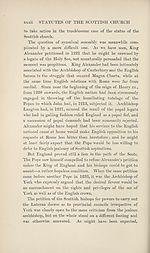Series 1 > Statutes of the Scottish Church, 1225-1559
(36) Page xxxi
Download files
Complete book:
Individual page:
Thumbnail gallery: Grid view | List view

INTRODUCTION
XXXI
friends of the church admitted that the multiplication of
heresies and the widening gulf between the people and their
spiritual guides was largely due to the simony, luxury,
worldliness, and unholy lives of many of the clergy and of
the monastic orders. It was to check these evils that in
1213 Innocent summoned a twelfth General Council, to be
held, like the last three, at Rome in ‘the mother and
head of all the churches of the city and of the world,’ the
cathedral church of St. John in Laterano.
The council, which held in all three sittings, in November
1215, besides commending the Crusade to the support of
Christian princes and peoples, and sanctioning the doctrine
of transubstantiation, condemned the heresies of Cathari and
Waldenses, laid heavy disabilities on the Jews, and passed a
long series of disciplinary measures, for which evidently the
time was fully ripe. It also enacted inter alia that through¬
out the Christian church metropolitans should hold provincial
councils yearly to correct abuses, to reform morals, and to
enforce the statutes of general councils.
Amongst the prelates who passed this decree were the
representatives of the Scottish church—the Bishops of St.
Andrews, Glasgow and Moray, and the abbot of Kelso in
person, and a number of unspecified deputies in name of the
other prelates of Scotland. They had been pronounced to be
outwith the provinces of York and Canterbury, but as they
notoriously had no metropolitan of their own, their anomalous
position was specially emphasised by the decree they had
assisted in enjoining on the whole of Christendom. And
now, or soon after, they took whatever steps were necessary
formally to impress upon the Holy See that the church they
represented was not in a position to carry out this laudable
instruction without the special assistance of the Pope and the
grant of autonomous powers never as yet conferred.
A few months after the dismissal of the council Innocent
died; and it was reserved for his successor, Honorius m..
XXXI
friends of the church admitted that the multiplication of
heresies and the widening gulf between the people and their
spiritual guides was largely due to the simony, luxury,
worldliness, and unholy lives of many of the clergy and of
the monastic orders. It was to check these evils that in
1213 Innocent summoned a twelfth General Council, to be
held, like the last three, at Rome in ‘the mother and
head of all the churches of the city and of the world,’ the
cathedral church of St. John in Laterano.
The council, which held in all three sittings, in November
1215, besides commending the Crusade to the support of
Christian princes and peoples, and sanctioning the doctrine
of transubstantiation, condemned the heresies of Cathari and
Waldenses, laid heavy disabilities on the Jews, and passed a
long series of disciplinary measures, for which evidently the
time was fully ripe. It also enacted inter alia that through¬
out the Christian church metropolitans should hold provincial
councils yearly to correct abuses, to reform morals, and to
enforce the statutes of general councils.
Amongst the prelates who passed this decree were the
representatives of the Scottish church—the Bishops of St.
Andrews, Glasgow and Moray, and the abbot of Kelso in
person, and a number of unspecified deputies in name of the
other prelates of Scotland. They had been pronounced to be
outwith the provinces of York and Canterbury, but as they
notoriously had no metropolitan of their own, their anomalous
position was specially emphasised by the decree they had
assisted in enjoining on the whole of Christendom. And
now, or soon after, they took whatever steps were necessary
formally to impress upon the Holy See that the church they
represented was not in a position to carry out this laudable
instruction without the special assistance of the Pope and the
grant of autonomous powers never as yet conferred.
A few months after the dismissal of the council Innocent
died; and it was reserved for his successor, Honorius m..
Set display mode to:
![]() Universal Viewer |
Universal Viewer | ![]() Mirador |
Large image | Transcription
Mirador |
Large image | Transcription
Images and transcriptions on this page, including medium image downloads, may be used under the Creative Commons Attribution 4.0 International Licence unless otherwise stated. ![]()
| Scottish History Society volumes > Series 1 > Statutes of the Scottish Church, 1225-1559 > (36) Page xxxi |
|---|
| Permanent URL | https://digital.nls.uk/126917418 |
|---|
| Attribution and copyright: |
|
|---|
| Description | Over 180 volumes, published by the Scottish History Society, containing original sources on Scotland's history and people. With a wide range of subjects, the books collectively cover all periods from the 12th to 20th centuries, and reflect changing trends in Scottish history. Sources are accompanied by scholarly interpretation, references and bibliographies. Volumes are usually published annually, and more digitised volumes will be added as they become available. |
|---|


